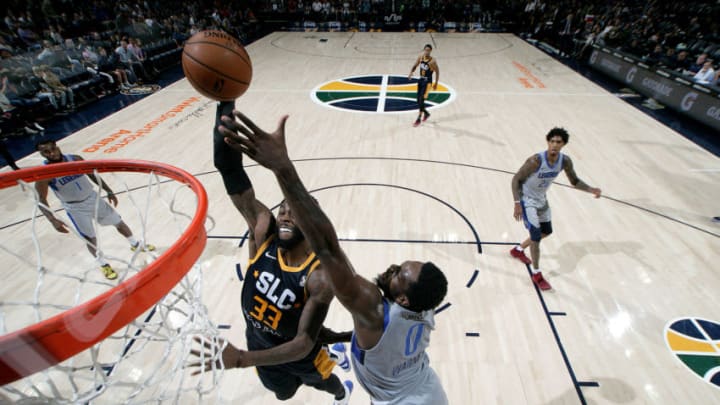The Salt Lake City Stars are off to a great start thanks to Utah Jazz two-way player Tyler Cavanaugh and No. 1 G-League Draft pick Willie Reed.
Since making the move from Boise, Idaho in 2016, the Salt Lake City Stars — the Utah Jazz’s affiliate squad — have left little doubt that the G-League is more about player development than wins and losses. Over that two-year stretch, the Stars’ record is just 30-70.
So far this season, though, the team is having its cake and eating it too, winning its first two games in impressive fashion.
First came a 35-point blowout of the Iowa Wolves on opening night, a game in which the Stars shot 59 percent from the floor and drained 13 threes.
Salt Lake followed that up with a comeback win over the Texas Legends on Tuesday. After trailing by 10 at halftime, the Stars locked in defensively and would hold the Legends scoreless over the game’s final four-plus minutes.
Maybe the Stars’ struggling parent club should be taking notes?
In any case, much of the credit for the squad’s early success goes to Tyler Cavanaugh, a two-way guy from the Jazz, and the first overall pick in last month’s G-League Draft, Willie Reed.
In a league that’s all about building NBA players, Reed and Cavanaugh both have quality experience in the Association already. They’re about as close to finished products as you’ll see in developmental, and they’re showing out in a big, bad way.
In particular, Reed has size, length, athleticism and skills that put him a rung above your average G-Leaguer. He’s a hair under seven feet tall with a 7-foot-3 wingspan, he’s got good paint presence on both sides of the ball and has a track record as a strong roll man who can finish above the rim.
Entering Wednesday’s games, Reed is the G-League’s third leading scorer at over 32 points per game (on 78 percent shooting). He was really on fire in his Stars debut, hitting 15 of his 17 shot attempts.
Willie Reed led us with a double-double posting 34 points (15-17 shooting) and 14 rebounds in the win tonight. #ItStartsHere⭐️ pic.twitter.com/5piA8rXHlr
— Salt Lake City Stars (@slcstars) November 3, 2018
He’s also an early top-fiver in rebounding at 15 per contest. That number is perhaps the least surprising part of Reed’s performance so far. He’s a world-class rebounder, particularly on the offensive glass; in his 152 career NBA games, he has an offensive rebound rate over 12 percent.
Meanwhile, Cavanaugh is putting up a cool 26.5 points per game and knocking down 58 percent of his 3-pointers on the young campaign. The triples were really raining against the Legends, as the former NIT MVP knocked down 9-of-14 tries from distance, tying Naz Mitrou-Long‘s single-game record en route to a 35-point night.
.@tycav34 couldn't miss tonight. He led us in scoring with 35 points (9-14 from deep) and grabbed 11 rebounds. #TeamIsEverything @utahjazz pic.twitter.com/GxtAZ42Mqg
— Salt Lake City Stars (@slcstars) November 7, 2018
If the Jazz get hammered with injuries again, he’ll be a solid option to come in for depth. He did the same for the Atlanta Hawks last season and averaged five points in 13 minutes per game. Cavanaugh also hit 36 percent of his triples; his 3-point shooting is clearly something that could help the Jazz in a pinch.
For now, though, he and Reed will lead a Stars attack that could become even more potent as former first-round pick Tony Bradley wracks up G-League assignments and Trey Lewis and Isaac Haas return from injury.
As ever, the Stars exist to be the Jazz’s developmental arm. But for the first time since the team stopped being the Idaho Stampede, victories may be part of the package, too.
